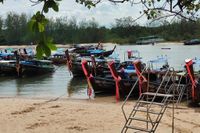As Thailand gears up for its vibrant Songkran festival, a Facebook post from a Cambodian page has sparked a wave of amusement and debate among Thai netizens. The post claims that Thailand should either cease its Songkran celebrations or pay a licensing fee of 25% to Cambodia, arguing that the festival is a longstanding cultural heritage of the ancient Khmer Empire.
The post stated, "Thailand must stop organizing Songkran and return it to its original roots, as it is a thousand-year-old culture of the ancient Khmer Empire. Thailand has stolen it for profit and become rich from it." This declaration has led many in Thailand to chuckle, with some expressing disbelief at the suggestion.
In a related note, concerns have emerged among Thai citizens regarding the potential for foreign organizations to manage the Songkran festivities. Some fear that this could lead to a dilution of Thailand's unique cultural identity. The Facebook post highlighted these worries, suggesting that Thais are already losing 25% of their rights to foreigners when Songkran is organized.
Meanwhile, the Tourism Business Association of Krabi has launched a campaign to encourage more Thai tourists to travel during the Songkran festival, especially in light of recent events that have caused a dip in local tourism. Following a 3.5 magnitude earthquake in Krabi, locals have been hesitant to travel, while international tourists continue to flock to the region.
Mr. Ungkul Seelathewakul, the President of the Tourism Business Association of Krabi, emphasized the importance of restoring confidence among tourists. He stated, "We are working closely with tourism operators to create awareness and promote Krabi as a new and attractive destination." The association's 'Spend the Night' campaign is designed to encourage Thai tourists to explore their own country more, especially during this festive season.
During the first half of April 2025, Thailand welcomed over 10.7 million tourists, generating approximately 516.6 billion baht in revenue. The influx of visitors marks an increase of 10.73% compared to the previous year. This surge in tourism is partly attributed to the government's efforts to promote the Maha Songkran World Water Festival 2025 and various regional activities in places like Chiang Mai and Khon Kaen.
Mr. Sarawut Thienthong, the Minister of Tourism and Sports, noted that the number of tourists from short-haul destinations has risen by 17.61%, with significant contributions from Chinese and Indian travelers. He stated, "We are focusing on increasing domestic tourism during the Songkran festival, which has seen a remarkable turnout this year."
Despite the earthquake affecting local tourism, international visitors have shown no signs of slowing down. Reports indicate that while Thai tourists have altered their travel plans, foreign tourists continue to visit Krabi and other popular destinations without canceling their accommodations.
Mr. Chaiyapat Watsunthorn, a member of the Tourism Business Association of Krabi, acknowledged the impact of the earthquake, particularly on domestic tourists. He said, "After learning about the earthquake, many Thai tourists have changed their travel plans, especially for coastal trips. However, international tourists remain undeterred, and we have not seen any cancellations in bookings."
In a recent meeting with tourism operators, Mr. Ungkul emphasized the need for effective disaster preparedness plans. He stated, "Natural disasters like earthquakes are unpredictable, but with a solid response plan, we can mitigate potential losses and reassure our visitors."
On the islands of Koh Lanta and Koh Phi Phi, tourism has remained stable despite the earthquake. Local operators reported that inquiries about the situation have increased, but once tourists are informed of the facts, their concerns dissipate.
As Thailand continues to attract millions of tourists, the government is optimistic about the ongoing tourism season. Plans are in place to promote additional activities and boost travel confidence, especially following the recent earthquake.
While the debate over Songkran's cultural roots continues, the festival remains a significant draw for both locals and tourists. The government is committed to preserving this cherished tradition while ensuring that it evolves to meet the needs of a diverse audience.
In conclusion, as Thailand celebrates Songkran this year, the interplay between cultural heritage and modern tourism dynamics is more evident than ever. The ongoing discussions about the festival's origins highlight the complexities of cultural ownership in an increasingly interconnected world.




